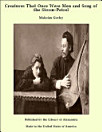The Man Who was Afraid
Mär 2019 · Otbebookpublishing
E-Book
287
Seiten
family_home
Zulässig
info
reportBewertungen und Rezensionen werden nicht geprüft Weitere Informationen
Über dieses E-Book
Autoren-Profil
Maxim Gorky, born Alexei Maximovich Peshkov in 1868, emerged as a towering figure in Russian literature and political activism. Orphaned at an early age, Gorky's tumultuous childhood and subsequent years as a wanderer deeply influenced his writing, imbuing it with a raw, unfiltered portrayal of the human condition. His pseudonym, "Gorky," meaning "bitter," reflects the harsh realities he often depicted.Gorky's literary career began in the 1890s, and he quickly gained acclaim for his short stories and plays that highlighted the plight of the underprivileged. His works are celebrated for their vivid characterizations and social critique, making him a central figure in the Russian Realist movement. Gorky's friendships with literary giants like Anton Chekhov and Leo Tolstoy further cemented his status in the literary world.A fervent supporter of the Bolshevik Revolution, Gorky's political activism was as influential as his literary contributions. He used his platform to advocate for social justice and workers' rights, often clashing with the Tsarist regime. However, his relationship with the Soviet government was complex; while initially supportive, he later criticized the oppressive measures of Lenin and Stalin, leading to periods of tension and exile.Gorky's legacy extends beyond his literary achievements; he was instrumental in shaping Soviet literature and culture. His revolutionary ideas and commitment to social change inspired countless contemporary writers and activists. Despite controversies and political strife, Gorky remains a symbol of resilience and a voice for the marginalized, making his life and work profoundly relevant to modern readers.
Dieses E-Book bewerten
Deine Meinung ist gefragt!
Informationen zum Lesen
Smartphones und Tablets
Nachdem du die Google Play Bücher App für Android und iPad/iPhone installiert hast, wird diese automatisch mit deinem Konto synchronisiert, sodass du auch unterwegs online und offline lesen kannst.
Laptops und Computer
Im Webbrowser auf deinem Computer kannst du dir Hörbucher anhören, die du bei Google Play gekauft hast.
E-Reader und andere Geräte
Wenn du Bücher auf E-Ink-Geräten lesen möchtest, beispielsweise auf einem Kobo eReader, lade eine Datei herunter und übertrage sie auf dein Gerät. Eine ausführliche Anleitung zum Übertragen der Dateien auf unterstützte E-Reader findest du in der Hilfe.







